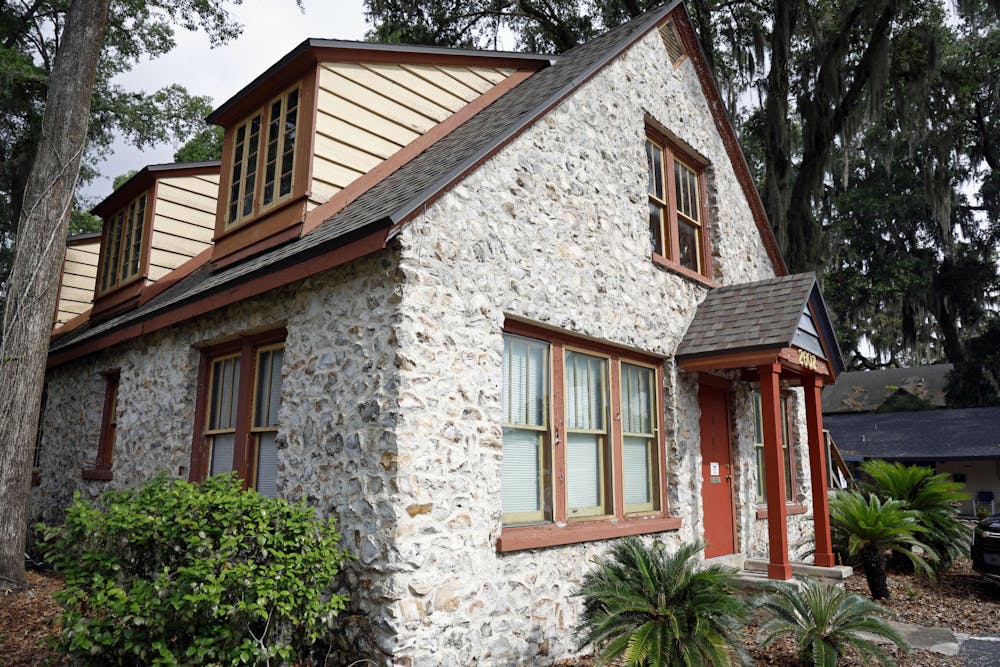For formerly incarcerated people, transitioning back to civilian life can be difficult, whether it’s finding a job that will take them or finding housing. Released Reentry hopes to close that gap.
Launched in 2023, Released Reentry aims to help formerly incarcerated people through substance use workshops, shared housing, housing and employment resources, individualized mental health treatment plans and therapy groups.
Alachua County ranked No. 12 in 2018 Florida county-level recidivism rates, according to a 2022 recidivism report. The Florida Department of Corrections describes recidivism as a return to prison by recommitting or violating probation within three years of initial release.
Alachua County Court Services Assistant Director Joe Lipsey attributed the issue to the high student and homeless populations in Gainesville.
“Some of them find themselves away from their parents for the first time,” he said. “We have pockets of low-income residents who may be involved in some criminal activity or substance dependency or homelessness.”
Lipsey said Alachua County court services provide enough resources, including county probation, a reporting program, mental health court and veterans court, but the formerly incarcerated don’t take advantage of them.
However, Alachua County Jail Director Jeff Cloutier said the county programs are not properly advertised.
“I think we need to do a better job collaborating and trying to make sure that all resources are in the same room so that we know what's available,” Cloutier said.
Released Reentry Founder Emily Westerholm was formerly incarcerated herself decades prior. She created the program due to the lack of reentry support in Alachua County for people released from prison, which she said contributes to high recidivism rates.
In 2018, the Alachua County recidivism rate was 29.2%, according to the Florida Department of Corrections. This rate surpasses the statewide rate of 21.2%.
People who’ve been incarcerated on burglary, sexual offenses and robbery were also more likely to be rearrested in Florida.
“I knew that there was a gap in services here,” Westerholm said.
With the reintegration program, Westerholm aims for a 2 to 5% reduction in county returning criminal rates.
The 49-year-old Gainesville resident said she wants to navigate people in the right direction, as readjustment can often be a large transition. People participating in the program don’t transform overnight, Westerholm said.
“People get overwhelmed when they come home. There's a lot of trauma, so sometimes they need another voice,” she said. “You really need to meet people where they are when they're coming home and try to empower them.”
Released Reentry aims to meet this goal by supplying resources for social security cards and food stamps, which allows for personal employment and housing advocacy. These plans are individualized to meet each participant’s specific needs, Westerholm said.
For the past 10 years, Alachua County's incarceration rate has surpassed the state incarceration rate, and it also had the 11th highest poverty rate among Florida counties in 2022, according to the Florida Department of Health.
Incarceration rates correspond with poverty levels, Westerholm said.
Just Income GNV, an income pilot guaranteeing income for the formerly incarcerated, was launched in 2021. The program awarded an initial $1,000 to those selected and $600 thereafter for a year, according to a Just Income GNV news release.
“Despite diminished economic opportunities, justice-impacted people are often required to pay fines and fees for probation, mandatory classes, court costs, and electronic monitoring, to name a few. An inability to pay fines and fees can result in reincarceration — effectively criminalizing poverty,” according to the news release.
Around two in ten Alachua County residents lived below the poverty line in 2022, according to the Florida Department of Health.
“Alachua County has a really, really high poverty rate,” Westerholm said. “A lot of times when people are poor and struggling, they want to survive.”
Released Reentry volunteer Leonides Morales has volunteered with the program for roughly three months.
Formerly incarcerated in Pennsylvania for 24 years, Morales now assists Westerholm and works alongside other justice-impacted participants of the program, which he said provides them with direction.
Readjusting following incarceration is difficult, Morales said, but having access to people with similar experiences makes the reentry process clearer.
“It’s a little easier when you talk to someone who’s already been through that,” he said.
While some people can readjust after serving time, others have been too impacted by prison life to succeed, Morales said. Of the approximate 100 participants in the program, he said most come willingly with hopes of learning to navigate life beyond incarceration, while others have been encouraged by parole officers.
“People have to want it for themselves,” he said. “So I can help and help and help someone, but until they're ready to help themselves, it will never fully take its toll.”
Participants of the program must remain consistent with attending meetings and utilizing the program’s resources, Morales said.
Released Reentry sends participants to Three Rivers Legal Services, a nonprofit law firm that does pro bono work to help formerly incarcerated people have their former charges expunged.
Felonies and misdemeanors can create barriers to housing and employment, and removing those charges from a person’s record can help them with a fresh start, according to the TRLS website.
Volunteering was a wonderful experience, Morales said, and he hopes to pay it forward to people starting the process at square one.
With those Morales worked with, he said he noticed major improvements in their demeanor and confidence.
“If you see us guys, don't be scared to talk to us,” he said. “We're here to help.”
Contact Lee Ann Anderson at landerson@alligator.org. Follow her on X @LeeAnnJOU.
Lee Ann Anderson is a sophomore journalism major and The Alligator’s Summer 2023 criminal justice reporter. In her free time you can catch her reading articles, talking to her cat or losing her mind.






